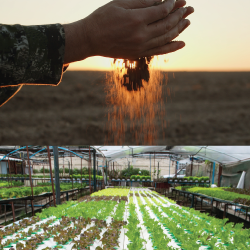Is This the End of Credibility for the “USDA Organic” Label?
SAVE ORGANIC STANDARDS
@OrganicConsumer | | Read the Full Article
Longtime Minnesota organic farmer and national leader Jim Riddle writes:
“The fundamental concepts of organic farming have always been, ‘Feed the Soil, not the Plant,’ and ‘Healthy Soil leads to Healthy Crops, Healthy Animals, Healthy People, and a Healthy Planet.’ Now, those concepts have been turned on their head, with a recent Appeals Court ruling that you don’t even need soil for growing terrestrial crops, in order to be certified organic in the United States.
Will the 9th Circuit Court’s September 2022 ruling, which stated, ‘no part of the statute [the 1990 Organic Foods Production Act] clearly precludes organic certification of crops grown hydroponically,’ mean the end of organic farming, as we know it? Maybe. Maybe not.
If the ruling is allowed to stand, it will mean that crops grown using hydroponic methods can officially be certified as ‘organic,’ as has been done by a handful of renegade certification agencies for a number of years. Consumers will continue to be deceived when they buy organic products, thinking that such products were grown in healthy soil, using methods that ‘foster cycling of resources, promote ecological balance, and conserve biodiversity,’ as required by the legal definition of ‘organic production.’
It will also mean that authentic organic farmers, who produce crops in healthy soil, who protect and enhance the biological diversity of their operations, and who use green manures, cover crops, crop rotations and compost to recycle nutrients, will continue to compete with hydroponic operations that use inputs ‘approved for organic use,’ but do not comply with the soil building, crop rotation, and ecological requirements of the Organic Foods Production Act (OFPA) and the National Organic Regulations (7 CFR 205).
The Court’s ruling directly contradicts a stated purpose of the OFPA, which is ‘to assure consumers that organically produced products meet a consistent standard.’ Consumers who purchase ‘organic’ blueberries, blackberries, raspberries, tomatoes, peppers, cucumbers and leafy greens will have no way of knowing if those products were produced by operations that comply with all requirements of OFPA and 7 CFR 205, or if those products were produced by hydroponic operations that only use ‘approved inputs’ in their nutrient solutions.”
Learn more (read the comments as well): The End of Organic (As We Know It)

